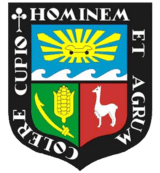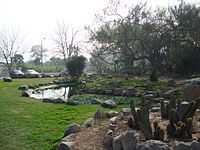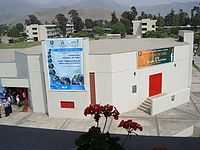National Agrarian University
| National Agrarian University (UNALM) | |
|---|---|
| Universidad Nacional Agraria La Molina | |
 | |
| Motto | Colere cupio Hominem et Agrum (in English: I want to work on the Man and on the Land) |
| Established | 1902 |
| Type | Public (National) |
| Rector | Dr. Jesús Abel Mejía Marcacuzco |
| Students | 5.070 |
| Undergraduates | 4521 |
| Postgraduates | 549 |
| Location |
Lima, |
| Campus |
Suburban 550 acres (2.2 km2) |
| Colors | Green |
| Website | www.lamolina.edu.pe |
The National Agrarian University, also formally called National Agrarian University - La Molina (Spanish: Universidad Nacional Agraria La Molina) (UNALM), is a public university in Lima, Peru. It is the country's best university in the fields of agricultural and forestry sciences. The university is organized into eight faculties which contain twelve academic departments. It is considered one of the most important institutions of higher education in Peru.
History

In 1901, during the government of President Eduardo López de Romaña, the creation of the National School of Agriculture and Veterinary Science was planned with the participation of a Belgian mission. The official inauguration of the school was on July 22, 1902. In 1912, the Central Agronomic Station was created with the purpose of developing the agricultural sector. A campus in the Fundo Santa Beatriz served as the school's first location. The university's current campus, in La Molina, was inaugurated in 1933. In 1960, the school was officially recognized as a university and was renamed to its current name.
In 1961, the faculties of Agriculture, Animal Science, Agricultural Engineering and the Institute for Research and Advanced Studies began work as academic organizations. In the same year, the institution decreed the creation of the Faculty of Life and Physical Sciences and the Faculty of Economics and Social Sciences (both simultaneously started work in early 1962). The faculties of Forestry Science, of Fisheries Science and of Food Sciences and Technology began operating in 1963,1966 and 1969 respectively.
The National Agrarian University is governed by the University Act No. 23733, promulgated on December 9, 1983, which maintains the academic separtments, restored the faculty system and frees each university to organize and establish its own academic system, according to their characteristics and needs. According to the current University Act, the governance of universities and the faculties are exercised by University Assembly, University Council, Rector and Faculty Council and Dean.
Faculties and programs

The university is organized into eight faculties and twelve academics departments. Each department offers an undergraduate program. The graduate school has 33 academics programs.
| Undergraduate | ||
|---|---|---|
| Faculty of Agronomy | ||
| Faculty of Life and Physical Science |
| |
| Faculty of Forestry Science | ||
| Faculty of Economics and Planning | ||
| Faculty of Food Science and Technology |
| |
| Faculty of Agricultural Engineering |
| |
| Faculty of Fisheries Science | ||
| Faculty of Animal Science |
| |
| Masters | ||
| Economics |
| |
| Environment |
| |
| Agricultural Sciences |
| |
| Nutrition and Food |
| |
| Doctorates | ||
| ||
Research
The National Agrarian University has always worked significantly in the scientific development of Peru throughout its history. In Peru, this university is one of the few that conduct research; only 10 universities in over 80 do. This is due primarily to the lack of funding research development by the Peruvian government in recent decades.
Research institutes
The university has the following research institutes:
- INDDA (Agro-Industrial Development Institute)
- IBT (Biotechnology Institute)
- IPPS (Institute for Sustainable Small Production)
- IRD Costa (Regional Development Institute - Costa)
- IRD Sierra (Regional Development Institute - Sierra)
- IRD Selva (Regional Development Institute - Selva)
Gallery
-
Auditorium of the graduate school.
-
Classrooms (rear view).
-
Meteorology Station.
-
Crops of aloe vera.
-
Crops of cotton.
Community services
In addition to undergraduate and graduate specialties, UNALM offers consulting, short courses, refresher and retraining technical and professional specialization semester courses, refresher courses and technical laboratory in biology, gardening workshops, hydroponics, raising small animals (guinea pigs, quail, etc.), bakery, dairy, meats, etc. UNALM has a riding school, a language centre and offers agro products to the community through its sales center.
See also
| |||||
External links
- Universidad Nacional Agraria La Molina - Official site



